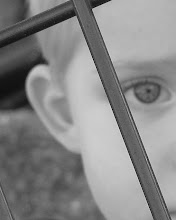Little Guy had his five year check up with his pediatritian last week. Everything looked great - Little Guy is growing beautifully and all of his body systems look healthy. At the end of the appointment, the doctor and I spent a few minutes discussing Little Guy's Asperger diagnosis. The physician seemed pleased with the progress my son has made over the year in regards to increased eye contact and a greater desire for interaction with others.
I attributed these positive changes to an early diagnosis. The doctor whole-heartedly agreed with me, then went on to share some wonderful information. He told me that health care professionals are starting to screen toddlers for signs of austism as early as 18 months, then again at two years.
This was music to my ears.
Early diagnosis = early intervention.
Earlier intervention = a chance to change and/or minimize behaviors while the brain is young and pliable.
I feel this could have made a world of difference for Big Guy. He was misdiagnosed with ADD in second grade and given medication he really didn't need. After years of worry and frustration, he finally received an Asperger diagnosis at age 16. At that point many of his behaviors were already ingrained, and we had missed the opportunitiy to intervene at critical points in his development. Although we did many things instinctively right at as his parents, there are certain situations we look back on and wish we could change. We wish we would have been armed with the knowledge we now have.
That's why, when Little Guy showed many of the early characteristics Big Guy had as a baby, I pushed to have him evaluated. Against the recommendation of close family members who were worried about "labeling" him. I felt that if Little Guy was on the spectrum, it would be beneficial for him to receive help as early as possible.
Has it made a difference? I believe so. Although we struggle with spectrum issues daily, Little Guy is high functioning. And while he still experiences meltdowns, they are generally becoming less intense and shorter in duration. However, the most important development I've seen is a desire to be social. This is HUGE. Little Guy doesn't always understand what's appropriate and becomes overwhelmed in group settings, but he is doing fairly well when interacting with one or two of his peers. Since the desire is there, I hope we can use it to improve and expand his social skills.
Big Guy has never had this desire. Would this be different had we known earlier what he was facing and how to help him? We'll probably never know for sure, but my hunch is that it definitely could have helped.
When parents bring up concerns about their child's behavior and ask my advice, my response is always the same. IF YOU HAVE QUESTIONS ABOUT YOUR CHILD'S DEVELOPMENT, HAVE THEM TESTED. In many cases, the testing is free. And if others think you are being overprotective or paranoid - do it anyway. After all, you know your child better than anyone :) If nothing is wrong, you can experience peace of mind knowing everything is developing "normally". If a diagnosis is made, you will be given the knowledge and help to begin making positive changes in your child's life. Either way, I see it as a win-win situation!
Friday, December 16, 2011
Subscribe to:
Post Comments (Atom)


No comments:
Post a Comment